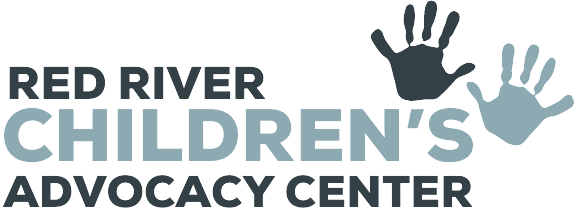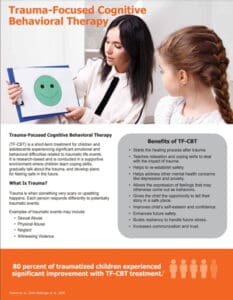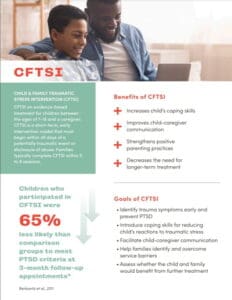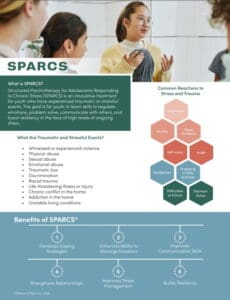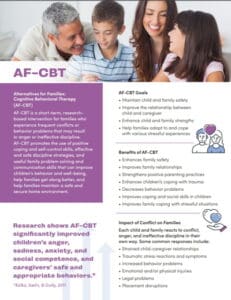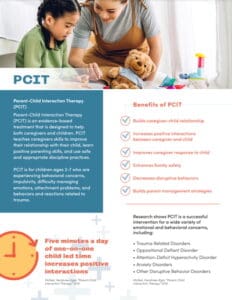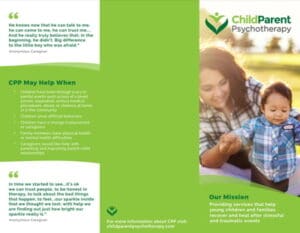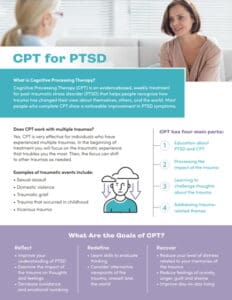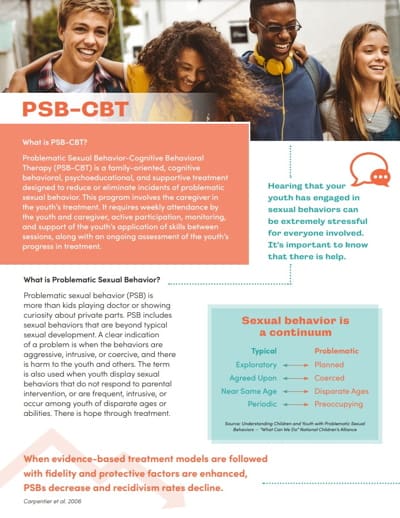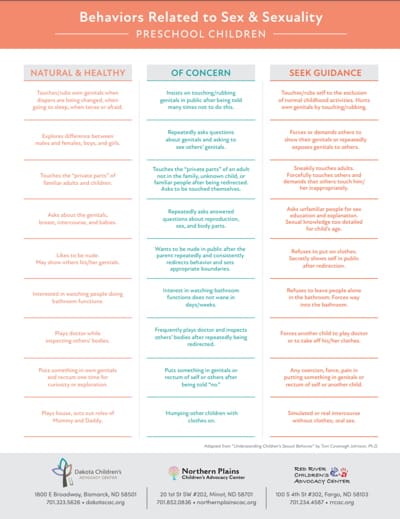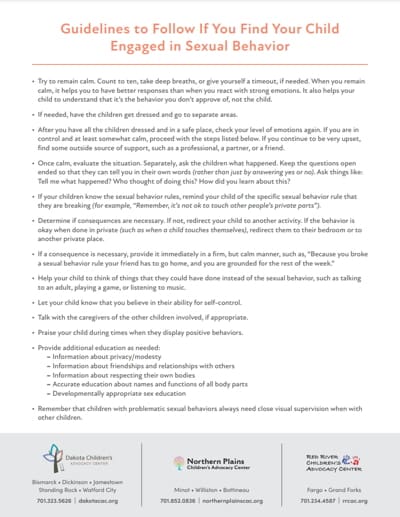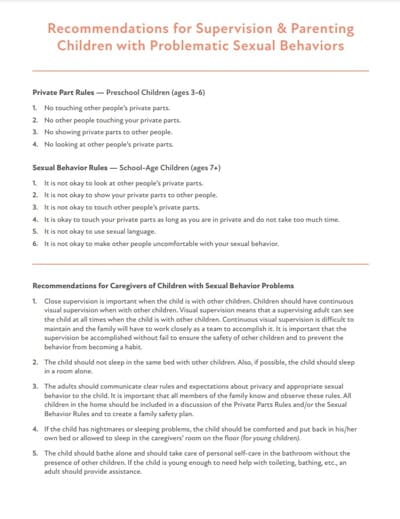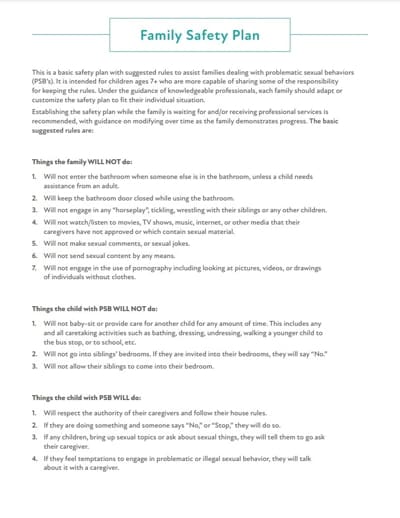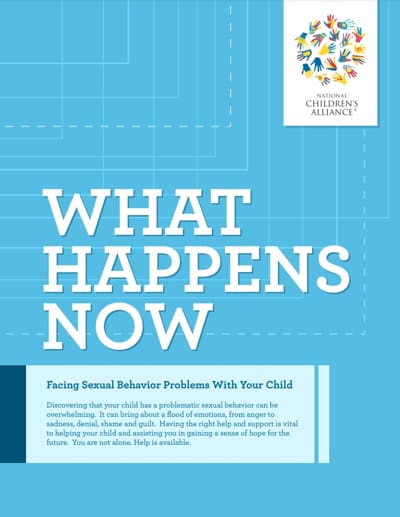Mental Health Services
Abuse and other forms of trauma can have lifelong effects on individuals, families, and communities. Many studies have shown a strong relationship between trauma and serious outcomes such as post-traumatic stress disorder, depression, anxiety, substance use, physical health problems, and even poverty and early death. But these outcomes can be prevented when individuals receive evidence-based services and support early on. Evidence-based treatments like those delivered at Red River Children’s Advocacy Center can significantly reduce trauma symptoms and prevent the long-term effects of exposure to trauma.
Red River Children’s Advocacy Center is committed to using evidence-based and trauma-specific screening, assessment, and treatments shown in research to be effective so that those affected by trauma can heal.
Mental health services at Red River Children’s Advocacy Center are provided at no cost to families and are offered in person or via telehealth. Referrals for mental health services are accepted from multidisciplinary team members.
Screening & Assessment
The Red River Children’s Advocacy Center offers mental health screening and assessment in order to identify an individual’s needs and facilitate a referral for the trauma-specific evidence-based treatment that will best meet those needs.
Evidence-Based Treatments for Trauma
Mental health treatment, sometimes referred to as therapy, is a unique opportunity to meet with a trained professional who will guide an individual through an evidence-based treatment in order to reduce their symptoms.
Red River Children’s Advocacy Center recommends the following evidence-based treatments:
Treatments
TF-CBT is a short-term treatment for children and adolescents experiencing significant emotional and behavioral difficulties related to traumatic life events. It has been extensively researched and is shown to provide significant improvement for most children. The treatment is individualized and conducted in a supportive environment where children learn coping skills, gradually talk about and process the trauma, and develop plans for feeling safe in the future.
CFTSI is an evidence-based treatment for children between the ages of 7-19 and their non-offending caregiver. CFTSI is a short-term, early intervention model that must begin within 45 days of a potentially traumatic event or disclosure of abuse. Families typically complete CFTSI within 5-8 sessions. CFTSI focuses on child-caregiver communication and skill building to address traumatic stress symptoms and decrease the need for longer-term treatment.
Download Information About CFTSI (PDF)
Video: https://vimeo.com/905611986
SPARCS is an innovative group treatment for youth who have experienced traumatic or stressful events. The goal is for youth to learn skills to regulate emotions, problem solve, communicate with others, and boost resiliency in the face of high levels of ongoing stress. SPARCS is a 16-session group for individuals ages 12-21. RRCAC offers SPARCS groups both in-person and by telehealth. Contact us to see when the next group is scheduled.
AF-CBT is a short-term, research-based intervention for families who experience frequent conflicts or behavioral problems that may result in anger or ineffective discipline. AF-CBT promotes the use of positive coping and self-control skills, effective and safe discipline strategies, and useful family problem solving and communication skills that can improve children’s well-being, help families get along better, and help families maintain a safe and secure home environment.
PCIT is an evidence-based treatment that is designed to help both children and caregivers. PCIT teaches caregivers skills to improve their relationship with their child, learn positive parenting skills, and use safe and appropriate discipline practices. PCIT is for children ages 2-12 who are experiencing behavioral concerns, impulsivity, difficulty managing emotions, attachment problems, and behaviors and reactions related to trauma.
CPP is an evidence-based treatment for young children from birth to age 5 and their caregivers. CPP supports family strengths and relationships, helps families heal and grow after stressful experiences, and respects family and cultural values.
CPT is an evidence-based, weekly treatment for adults with posttraumatic stress disorder (PTSD) that helps people recognize how trauma has changed their view about themselves, others, and the world. Most people who complete CPT show a noticeable improvement in PTSD symptoms. CPT consists of 12 modules that typically take 10-14 weekly sessions to complete. CPT can be completed in individual or group formats. Contact us to see when the next group is scheduled.
Availabiltiy
- Trauma-Focused Cognitive Behavioral Therapy
- Child and Family Traumatic Stress Intervention
- Structured Psychotherapy for Adolescents Responding to Chronic Stress
- Cognitive Processing Therapy
- Trauma-Focused Cognitive Behavioral Therapy
- Child and Family Traumatic Stress Intervention
- Cognitive Processing Therapy
- Parent Child Interaction Therapy
- Alternatives for Families Cognitive Behavioral Therapy
- Child Parent Psychotherapy
Receiving mental health treatment from a provider trained in evidenced-based treatments is important because these therapies have been extensively studied and repeatedly shown to be effective in reducing a specific symptom or behavior. The Treatment Collaborative for Traumatized Youth (TCTY) in North Dakota can help you find a provider trained in evidence-based trauma treatment.
Telehealth Outreach Program
Many children who need mental health services do not receive them, especially those children who have experienced trauma. Red River Children’s Advocacy Center’s Telehealth Program is available to reduce barriers and expand access to trauma-specific and evidence-based mental health services to the children and families we serve.
Clinicians at Red River Children’s Advocacy Center have been trained in adapting evidence-based trauma treatment models to be delivered with fidelity through telehealth.
Telehealth is simply receiving mental health services through electronic means whereby the clinician and client are in two different locations. Sessions are accessed through a secure video conferencing platform. A telehealth screening and thorough assessment are conducted to determine if telehealth services are a good fit for a child and family.
Mental health services are delivered through a secure video conferencing platform between the clinician, child, and family. This is set up by the CAC.
- Research suggests that TF-CBT via telehealth is just as effective as in-person treatment. Stewart et al. 2017
- Allows for flexibility and accommodations for families with busy schedules.
- Decreased class time missed by children for mental health services.
- Decreased work time missed by caregivers for mental health services.
- Reduces common transportation and distance barriers to treatment.
- Allows for more regular and consistent treatment attendance which can improve outcomes and reduce length of treatment.
Screening, Assessment, and Treatment
Telehealth services are available for individuals ages 7+. A screening will be completed to ensure that telehealth is a good fit for the individual and family.
A laptop, computer, or tablet with internet connection is required to connect to telehealth services. If you do not have one, equipment may be available for loan. RRCAC uses a secure, HIPAA compliant version of Zoom.
Telehealth services need to take place in a secure, private setting to ensure confidentiality. Services can take place in the home, at school, or another community agency. For safety, a designated adult is required to be available during the session and this may be verified by the clinician.
One of the most important predictors of healing after trauma is support from non-offending caregivers. Caregivers play an integral role in helping a child heal and ultimately treatment works best when caregivers are involved. A caregiver is required to be present during home-based telehealth services and participate, as needed, in the session. This includes checking in with the clinician at each session, supporting the child, and encouraging practice of skills.
Problematic Sexual Behavior in Children
Some sexual play between young children close in age, such as playing doctor or looking at private parts is considered normal. However, some sexual behaviors are inappropriate and potentially harmful. Problematic sexual behavior (PSB) includes sexual behaviors that are beyond typical sexual development or illegal. A clear indication of a problem is when the behaviors are aggressive, intrusive, or coercive, and there is harm to the youth and others. The term is also used when youth display sexual behaviors that do not respond to parental intervention, or are frequent, intrusive, or occur among youth of disparate ages or abilities. There is hope through treatment.
Causes of Problematic Sexual Behavior
There isn’t one type of youth who develops problematic sexual behavior. While some youth have suffered sexual abuse, many have not. In fact, most youth victims of sexual abuse don’t exhibit these behaviors. Problematic sexual behavior usually occurs when youth are feeling curious, anxious, angry, reacting to trauma, trying to imitate others, or calm themselves down. Youth who have problem sexual behaviors often have poor impulse control, social skills, and decision-making abilities.
- Research suggests that many factors can contribute to developing problematic sexual behavior, including Youth Vulnerability
- Exposure to sexual material, sexual abuse, or lack of sexual boundaries in the home
- Exposure to violence or physical abuse
- Factors that hinder caregiver guidance and supervision
Adapted from Friedrich et al. 2003
Treatment for Problematic Sexual Behavior
Problematic Sexual Behavior Cognitive Behavioral Therapy (PSB-CBT) is a family-oriented, cognitive behavioral, psychoeducational, and supportive treatment designed to reduce or eliminate incidents of problematic sexual behavior. The program involves the caregiver in the youth’s treatment. It requires weekly attendance by the youth and caregiver, active participation, monitoring, and support of the youth’s application of skills between sessions, along with an ongoing assessment of the youth’s progress in treatment.
The first step is a clinical evaluation to examine sexual behavior, overall emotional and behavioral functioning, and family needs. PSB-CBT is typically provided in a group format, once a week, with youth and caregivers meeting in separate groups at the same time. The treatment is provided as an open group, with most youth able to complete treatment successfully in 6 to 12 months depending upon the age of the youth and progress in treatment. Groups are based on age and developmental level.
